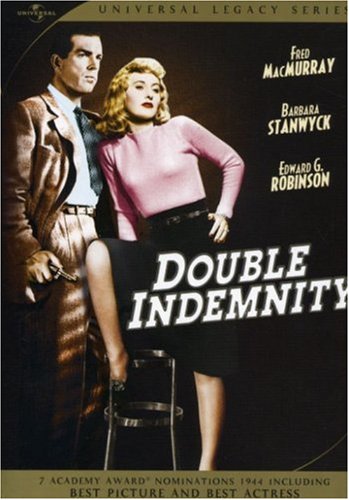Billy Wilder’s death at 95 summoned generous eulogies, and most of them rang true. He was an excellent writer-director, one of Hollywood’s rare originals. At his best – in perhaps a dozen of his many films – he displayed a caustic wit unusual in that sentimental, formulaic medium. And who else in the film industry could have produced movies as different as Double Indemnity and The Apartment?
 Double Indemnity (Univ...
Best Price: $4.31
Buy New $15.71
(as of 03:05 UTC - Details)
Double Indemnity (Univ...
Best Price: $4.31
Buy New $15.71
(as of 03:05 UTC - Details)
I use these two movies as illustrations for a specific reason: both of them cast the same comic actor as a villain, to brilliant effect. His name, of course, is Fred MacMurray, best remembered for the warm sitcom My Three Sons. In Double Indemnity he plots with Barbara Stanwyck to murder her husband in order to collect on a phony insurance policy; if there is anything implausible about this red-hot plot, it’s the idea that a man could even imagine living happily ever after with Stanwyck. But the plot twists make you overlook that; anyway, the irresistible desirability of a wicked dame is a given of the film noir genre, which Wilder never returned to despite this great success.
 The Billy Wilder DVD C...
Best Price: $39.24
Buy New $49.90
(as of 04:10 UTC - Details)
The Billy Wilder DVD C...
Best Price: $39.24
Buy New $49.90
(as of 04:10 UTC - Details)
In The Apartment, a bittersweet comedy more in keeping with Wilder’s other work, MacMurray plays a philandering business executive who cynically uses his mistress, played by Shirley MacLaine, and breaks her heart. Would anyone but Wilder have had the insight to see how perfect this light comedian could be in both these heavy roles?
Wilder’s other successes show his versatility: The Lost Weekend, Sunset Boulevard, Stalag 17, Some Like It Hot, and The Fortune Cookie. But his failures could also leave a bad taste. Irma La Douce, an attempt at a "sophisticated" European-style sex farce, is disgusting in conception and made worse by Jack Lemmon’s foolish performance. Wilder, a European Jewish refugee, was refreshing in his wry disdain for Hollywood banality, yet he could sometimes combine cynicism with his own kind of bathos – an unhappy mixture.
Like most people I love movies; but just because they are so popular we make too much of them as an art form. We tend to forget that the very nature of the genre is inhospitable to genius. The greatest painter needs only a canvas and paint; the greatest poet needs only a pen and paper. But a movie requires, in the first place, a lot of money and so many talents that it’s not altogether clear who deserves chief credit for the final result – actors, director, writer, producer?
Joseph Sobran (1946–2010), conservative turned libertarian, was one of the most significant American writers of his time. See his website and his intellectual journey.





